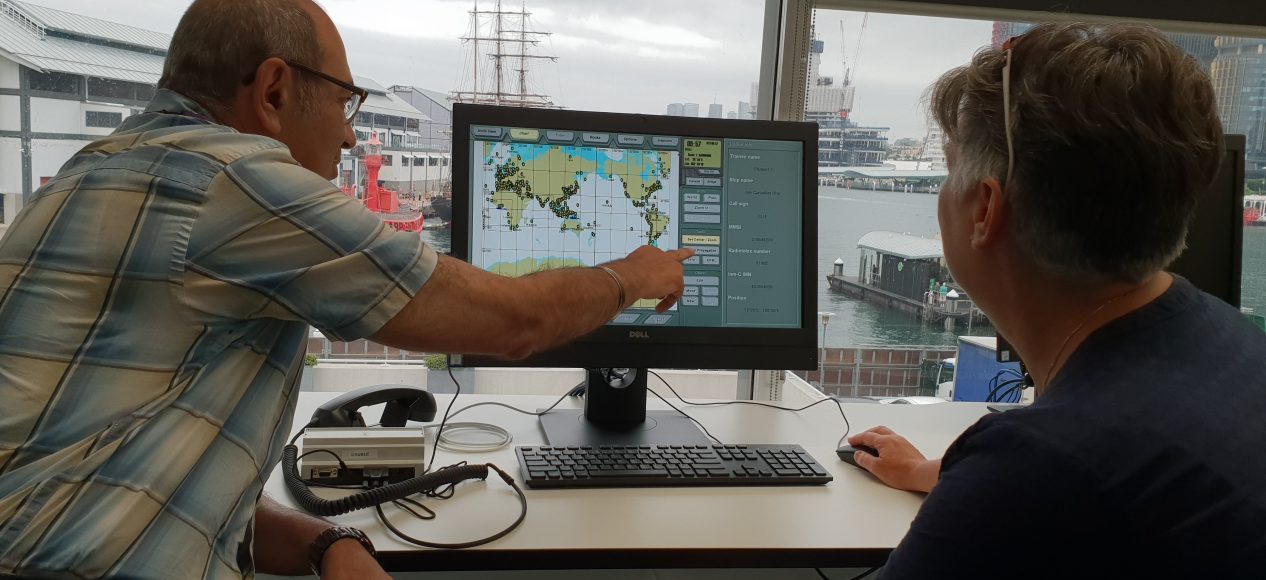Long Range Operator Certificate of Proficiency with Marine Satellite Communications Endorsement
Course also known as: LROCP, SATCOM
Gain the radio operator's Certificate of Proficiency required by Masters on vessels less than 35m meters plus the MSCE endorsement needed by anyone who sails on a vessel with INMARSAT equipment.
With an LROCP qualification you can operate both VHF marine radiotelephony equipment and MF/HF marine telephony equipment. AMC Search also offers the MSCE endorsement, which is required by anyone who sails on a vessel with INMARSAT equipment.
The course is delivered using a full GMDSS simulator for hands-on experience using satellite equipment to broadcast to stations around Australia and the globe.
The simulator is used for practical exercises including automated distress calls and communicating with shore stations. It also exposes students to different equipment, from legacy systems to modern touch screens.
Who should participate?
Masters on vessels less than 35m meters as well as anyone who sails on a vessel with INMARSAT equipment.
The course is ideally suited to participants in the annual Sydney Hobart Yacht race as all those on-board will require both qualifications.
Certification
The following certificates will be issued by the Office of Maritime Communications at the Australian Maritime College, who is responsible for the management of all functions associated with marine radio examinations and certification services in Australia:
- Long Range Operator Certificate of Proficiency (LROCP)
- Marine Satellite Communications Endorsement (MSCE or SATCOM)
Course Outline
Long Range Operator Certificate (LROCP) participants will be required to:
- Demonstrate a practical knowledge of GMDSS sub-systems and equipment which is appropriate to vessels operating in Australian waters on which a radio installation is not compulsory under international agreements. Specifically, MF/HF and VHF radio telephony equipment with digital selective calling (DSC) facilities, and emergency position indicating radio beacons of the 406 MHz and 121.5/243 MHz type.
- Demonstrate an ability to use MF/HF and VHF radio telephony and digital selective calling (DSC) operating procedures, particularly those relating to distress, urgency and safety.
- Demonstrate an understanding of simple maintenance practices required to keep the marine radio equipment specified in (1) in good working order, including the repair of minor faults.
- Demonstrate an understanding of the regulations applicable to ship stations equipped with radio telephony and digital selective calling facilities.
- Demonstrate a basic knowledge of the Australian marine search and rescue system.
- Demonstrate a practical knowledge of marine radio operations and equipment.
Marine Satellite Communications Endorsement (MSCE) participants will be required to develop an understanding of:
- The concepts underlying the Inmarsat satellite system, including location of satellites, global coverage, ocean regions, network coordination and control stations and land earth stations.
- The worldwide rescue coordination centre (RCC) network and automatic routing of distress messages.
Participants will be required to develop a detailed knowledge of:
- Transmission and reception of distress alerts.
- The procedures to be used should a false distress alert be inadvertently transmitted.
- Transmission and reception of priority alerts.
- The Enhanced Group Calling system for reception of Maritime Safety Information.
Participants will be required to develop knowledge of:
- The functionality of Inmarsat C and Fleet 77 equipment.
- Antenna stabilisation and shadows.
- The messaging facilities provided by Inmarsat C.
- Logging-in and logging-out of Inmarsat C.
- Two digit code safety services.
- Interfacing with navigational equipment and manual position updating of Inmarsat C.
- Authorised users of SafetyNET.
- How to perform testing of equipment to ensure functionality of Inmarsat C equipment.
- Radiation hazards associated with Inmarsat equipment installations.
- Demonstrate a practical knowledge of marine radio operations and equipment.

- Duration: 2 days
-
No course options currently available
We do not currently have any scheduled openings for this course.
To express interest, please contact us.
